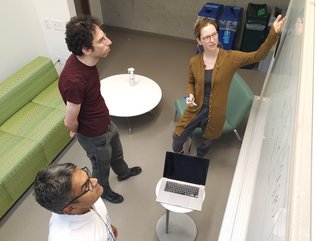Quantum computing may reset and remake global supply chains

US researchers say new advances in quantum computing are helping tackle supply-chain challenges caused by the war in Ukraine and the COVID-19 pandemic, which have disrupted manufacturing, delayed shipping, induced panic buying and sent energy costs soaring.
New research in quantum computing at Sandia National Laboratories is moving science closer to overcoming supply-chain challenges and restoring global security during future periods of unrest.
“Reconfiguring the supply chain on short notice is an exceptionally difficult optimisation problem, which restricts the agility of global trade,” says Alicia Magann, a Truman Fellow at Sandia National Laboratories, working on supply-chain challenges and the restoration of global security during future periods of unrest.
Magann has led the development of a new way to design programs on quantum computers, which she and her team think could be especially useful for solving these kinds of massive optimisation problems someday when quantum technology becomes more mature.
The Sandia team recently published the new approach in two joint papers in the journals Physical Review Letters and Physical Review A. Research was funded by the Department of Energy’s Office of Science, Office of Advanced Scientific Computing Research; the DOE Computational Science Graduate Fellowship; and Sandia’s Laboratory Directed Research and Development program.
Good solutions in short supply
Optimisation algorithms are crucial in coordinating trucking routes and managing financial assets in various industries. However, as the number of variables increases, the problems become increasingly challenging to solve, making it difficult to find good solutions. According to Magann, one of the long-term solutions for addressing these complex optimisation problems is to leverage quantum computers, a promising technology that experts believe can solve some problems much faster than supercomputers.
Around the world, researchers are actively developing large-scale optimisation algorithms for future technologies, hoping that these programs could help industries manage limited resources more effectively and quickly adapt operations to rapid changes in the labour market, raw material supplies, or logistics. By using quantum computing to address complex optimisation problems, industries can achieve better results and gain a competitive edge in their respective markets.
“It’s very difficult to come up with quantum algorithms,” says Mohan Sarovar, the principal investigator on the project. “One of the big reasons for this, apart from quantum computing being very unintuitive, is that we have very few general frameworks for developing quantum algorithms.”
Quantum computing dynamically adapts supply chains
The Sandia team has significantly reduced the role of classical computing by introducing a new framework called FALQON - Feedback-based Algorithm for Quantum Optimization. Unlike traditional optimisation processes that rely heavily on classical computing, the FALQON framework requires minimal computational power and only serves as a calculator. On the other hand, the quantum computer performs the bulk of the computation, making it suitable for tackling complex problems such as efficiently rerouting a shipping fleet in the event of sudden port closures.
In this context, a framework refers to the structure of an algorithm. Sandia's approach involves the quantum computer dynamically adapting its structure during the calculation process. The framework uses feedback mechanisms to determine the appropriate layers of quantum computing gates, which are the building blocks of quantum algorithms. This innovation has the potential to enable quantum computers to solve much more complicated problems in various fields.
“After I run the first layer of the algorithm, I measure the qubits and get some information from them,” says Magann. “I feed that information back to my algorithm and use that to define the second layer. I then run the second layer, measure the qubits again, feed that information back for the third layer, and so on and so forth.”
The current framework for quantum computing is still largely theoretical, as it can only be tested on problems that classical computers can already solve. However, researchers believe that the framework holds great potential in developing practical algorithms for medium-to-large-scale quantum computers in the future. The team is particularly interested in exploring how this framework could be utilised to develop algorithms for solving complex problems in chemistry, physics, and machine learning.
Sandia National Laboratories is a multimission laboratory managed by National Technology and Engineering Solutions of Sandia, a subsidiary of Honeywell International, on behalf of the US Department of Energy's National Nuclear Security Administration. The lab is responsible for research and development in areas such as nuclear deterrence, global security, defence, energy technologies, and economic competitiveness. It operates primarily out of its main facilities in Albuquerque, New Mexico, and Livermore, California.
- 81% of enterprises searching for new cybersecurity vendorsCyber Security
- Cybercriminals looking for ports in stormy new world of workCyber Security
- Misused monitoring tools turn phones into spies for spousesApplication Security
- Twitter fake news fans flock together in fear of missing outOperational Security






